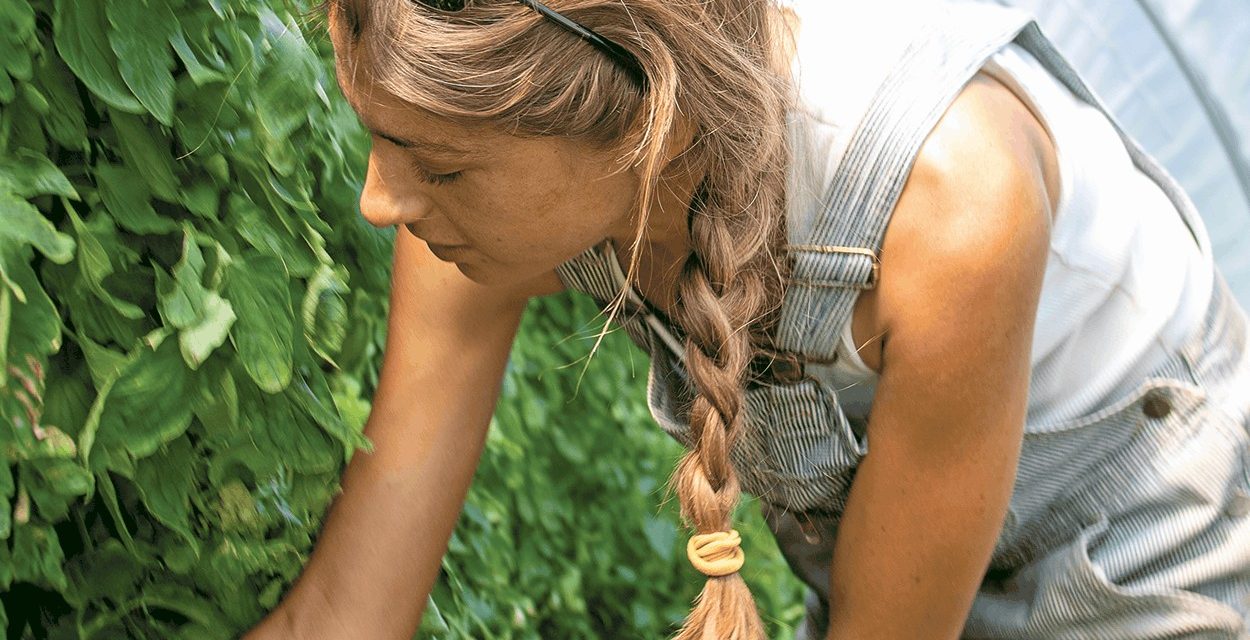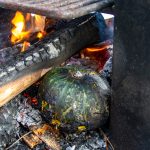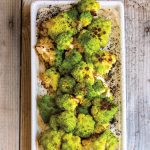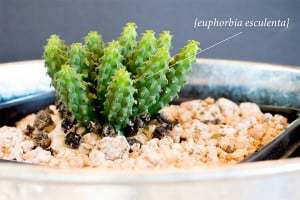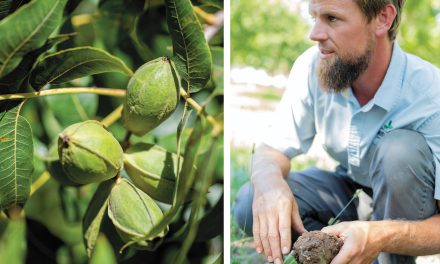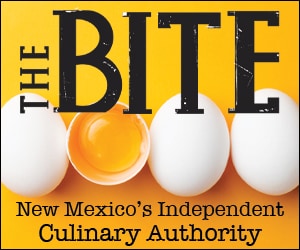Molly Mendenhall of Four Moons Farm
By Robin Babb · Photos by Stephanie Cameron

Four Moons Farm, a one-acre farm and homestead in Los Lunas, brims with life. Wildflowers and big bushes of lavender grow in the beds in front of the sprawling house. There are three hoop houses full of tomatoes on the south side of the property, and three dogs of disparate sizes barking at me from the backyard. White cabbage moths flitter through dense rows of kale and sunflowers, and dandelions populate almost every open inch of space. I hear the unmistakable call of a turkey from behind the house. This lush landscape feels far from the desert.
I watch Molly Mendenhall push a shovel into the dirt to loosen up a row of shallots, some of which have already started to send up their alien-looking flowers. Following along behind her, I pull them out of the ground, shaking them gently to scatter off the soil that clings to their roots. The sharp smell of alliums gets heavier as they come out of the ground.
It’s just past eight in the morning and it’s already hot, and more humid than in the city because we’re so close to the river. Mendenhall will be out here working until about five. Her deep tan and the holes in her overalls say she’s been doing this for a while. That, and the fact that she knows what she’s doing.
“Yeah, you can kind of grow anything here,” says Mendenhall when I comment on the great soil. “When I first looked at the property I thought, ‘this looks like some Rio Rancho beach sand, nothing is going to grow here.’ It is light in color, and super sandy with very little clay. It doesn’t stick to your shoes when it’s wet. It is well drained without being devoid of organic matter. It has consistently out-performed every other field I’ve worked.” She’s lucky to have it, certainly—but it still requires a skilled hand to make things grow.

Mendenhall grew up in Albuquerque’s North Valley, where some of her family still lives, and studied evolutionary psychology at UNM. She didn’t finish the degree, though. “I dropped out after three years when I realized what a job in the field would actually look like [more time spent in a classroom than doing research in the field], and that I’d have to take on some debt to pursue a higher degree in order to qualify for any such job. Which begged the question, what do I want my day-to-day routine to look like?”
Throughout school Mendenhall had also been making and selling jewelry, which she scaled up to full time when she dropped out. She admits that it wasn’t exactly a passion of hers, but more an “accidental career”—she never really wore much jewelry herself, and only kept making it because people kept buying it. She moved to Bosque Farms in 2010 to start gardening in earnest, and quickly came up with the idea to start a small CSA. For three years she kept up both the jewelry business and the CSA while she learned more about farming. With her dad, she bought the farm in Los Lunas, where farming quickly became her full-time job. “The jewelry was something different to me than it was to my customers,” Mendenhall says. “An eggplant, on the other hand, has a far more simple and straightforward function.”
Instead of apprenticing or working on somebody else’s farm for a few years, Mendenhall jumped into operating her own farm headfirst. This kind of education means that she’s developed her own ways of doing everything. For pest control, she keeps a few turkeys on the farm. They eat bugs, but unlike chickens, don’t scratch up her carefully-planted rows when they do so. This year she started using a new method of trellising her tomato plants inside hoop houses that will, she hopes, make for easier harvesting. By talking with other farmers at the weekend markets, she’s found that just about everyone does things differently—so maybe figuring things out for yourself isn’t such a bad way to learn.
Of course, she’s also learned some things by making mistakes. For years, she was storing her harvest and bringing it to market in portable coolers, just like the ones you grab beer out of at a barbeque. This made for limited storage capacity, and Mendenhall often had leftover vegetables going to seed and rotting in the fields. “I don’t know why it took me so long to get a walk-in [cooler]—it’s a total game changer,” she says. “If you get your ass kicked hard enough you remember the lesson.”
When the row of shallots is empty, we load them all on a hand truck and take them under the awning to bundle and hang them to cure in the house’s rafters. Mendenhall lives in a big three-bedroom house on her own—that is, besides the three dogs and the pet squirrel who keep her company. “I found him on the ground when he was just a tiny baby,” she says of the squirrel, who she now couldn’t return to the wild if she tried. “I probably should have just let nature take its course, but . . . ” she shrugs.
It’s a nontraditional pet for a farmer, for sure, but Mendenhall isn’t exactly a standard farmer. I am sure she had doubts along the way about doing it all on her own—planting, harvesting, getting everything to market, and making ends meet. But after almost ten years of farming, I suspect that those doubts have gotten a lot quieter in her mind. If there’s anything else she needs to learn, she knows that the land will teach her.
Edible celebrates New Mexico's food culture, season by season. We believe that knowing where our food comes from is a powerful thing. With our high-quality, aesthetically pleasing and informative publication, we inspire readers to support and celebrate the growers, producers, chefs, beverage and food artisans, and other food professionals in our community.

